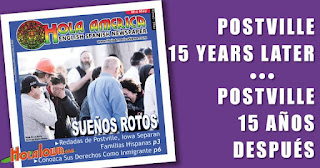Humanity at the Helm
When I was asked to write an article about the 15-year anniversary of the Postville immigration raid, I was nervous. It was a hugely emotional event that impacted hundreds of lives. I didn't want it to be a retelling of what happened, or paint the survivors as victims.
Listening as some told me about the fear that gripped them as children who hid in their basement for two weeks after hearing rumors of ICE vans driving around the town picking up anyone with dark hair and olive skin gave me chills. I grew up in Chicago in the 90's when gang violence ruled the streets so I know what it's like to be scared of your community. It took me back to the nights I lay in bed as gunshots popped around the neighborhood, praying none of them hit my dad as he walked home from work. That kind of horror and fear stays with you long after the dangers have passed.
I interviewed an attorney who drove four hours to Postville every weekend for over a year to work on hundreds of pro-bono cases to help families that had been ripped apart. She and I worked in the same building and spent our evenings across the hall from each other, often bringing our kids into the office so we could get more done; she working through cases while I launched a professional development program for Latinas. Both of us were focused on helping women, although it wasn't until this conversation that either of us realized the affect those long hours had on the women we focused on.
I watched several documentaries about the raid. The images of terrified people lined up and handcuffed while hundreds of armed officers pointed guns at them as though they were prisoners of war made me sick to my stomach. As details emerged about the conditions of the meat packing plant, I wondered why such a place would be targeted. Who did ICE think was going to work in that horrendous environment? Like most small towns in Iowa, recruiters lured workers from across Mexico and Guatemala because US citizens no longer took jobs killing hogs and cattle. Families were promised well-paying jobs, a safe place to live, and an education for their children. What they found were employers who exploited them, towns that didn't want them, and schools where there weren't adequate resources or English Language Learner programs to help their children. Even as towns dwindled because their native young people left for greater opportunities, they weren't welcoming to immigrants. It has always baffled me how prejudice and bias can make people so blind to the reality in front of them. In the case of small-town Iowa, many towns would be wiped off the map if immigrants hadn't revived them. Postville was no exception. They were a powerful economic force that was decimated in a few hours and for what? Their presence didn't make Postville dangerous. It was idyllic and nearly crimefree when the raid took place. It didn't bring anything positive to the town. It cost millions of taxpayer dollars and left a gaping hole where renters, homeowners, and taxpaying customers once lived. It created fear. It showed the ugliest part of the US and its penchant for allowing hate to guide policies.
That sick feeling only intensified when I researched the trial of the meat packing plant's owner and learned he didn't have any consequences for his role in the workplace violations that were uncovered. I was furious when I read that he was pardoned by Trump and welcomed to his community like a hero. What a show of politics over people and how blatant that the lives of these hard-working people was never valued. Humanity had to be at the center of the story. I wanted readers to admire the bravery and resilience of those living with the aftermath of what our government did.
I was excited when the article was printed in various publications. I'm proud of how it turned out and hope readers can feel the love I poured into it and the respect I have for the families who continue to fight to be reunited 15 years later.
